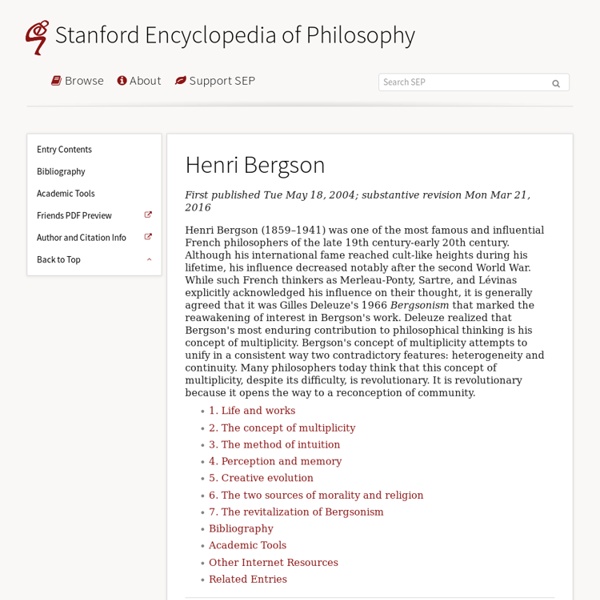Deleuze, Gilles
Deleuze is a key figure in postmodern French philosophy. Considering himself an empiricist and a vitalist, his body of work, which rests upon concepts such as multiplicity, constructivism, difference, and desire, stands at a substantial remove from the main traditions of 20th century Continental thought. His thought locates him as an influential figure in present-day considerations of society, creativity and subjectivity. Notably, within his metaphysics he favored a Spinozian concept of a plane of immanence with everything a mode of one substance, and thus on the same level of existence. Gilles Deleuze began his career with a number of idiosyncratic yet rigorous historical studies of figures outside of the Continental tradition in vogue at the time. Table of Contents 1. Gilles Deleuze was born in the 17th arrondisment of Paris, a district that, excepting periods in his youth, he lived in for the whole of his life. 2. The history of philosophy isn’t a particularly reflective discipline.
Browse By Author: B
Différance
William James
(ca. 1895, in , ed. by Henry James, Boston, 1920) 1. Chronology of James's Life 1842. 2. “Remarks on Spencer's Definition of Mind as Correspondence” (1878) Although he was officially a professor of psychology when he published it, James's discussion of Herbert Spencer broaches characteristic themes of his philosophy: the importance of religion and the passions, the variety of human responses to life, and the idea that we help to “create” the truths that we “register” (E, 21). James's characteristic empiricism appears in his claim that values and categories fight it out in the course of human experience, and that their conflicts “can only be solved ambulando, and not by any a priori definition.” “The Sentiment of Rationality” (1879, 1882) The substance of this essay was first published in Mind in 1879 and in the Princeton Review in 1882, and then republished in The Will to Believe and Other Essays in Popular Philosophy in 1897. 3. Even “introspection” covers a range of reports. 4. 5.
Deleuze pensando al cine. Tres tesis sobre movimiento recuperadas desde Henri Bergson. | Paradigmas
¿Qué implica pensar el fenómeno del movimiento? Surgen a partir de ésta inquietud una serie de preguntas acerca de si resultaría pertinente intentar hablar de tal suceso de maneras menos apegadas a conocimientos de la física tradicional, pensando en el verdadero acontecer que el proceso mismo del movimiento presenta a la percepción humana, lejos de resumir el asunto en fórmulas matemáticas. ¿Qué significa que todo esté en movimiento? ¿Cómo es que tal fenómeno se desenvuelve dentro del flujo de tiempo? Se expondrán aquí las tres tesis sobre movimiento que Deleuze reconfigura desde Bergson, estableciendo las diversas distinciones que se establecerían frente a las filosofías que igualmente han trabajado sobre tales categorías, pero con un carácter claramente distinto. Consecuentemente, hace Deleuze referencia a las críticas que el mismo Bergson, dentro de La evolución creadora, plantea con respecto a la constitución del cine como ilusión cinematográfica. Be Sociable, Share! Sugerencias:
The European Graduate School - Media and Communication - Graduate & Postgraduate Studies Program
Manuel DeLanda Annotated Bibliography
This page comprises an annotated bibliography of the work of philosopher Manuel DeLanda (1952-). DeLanda addresses a broad range of scientific and cultural concerns, and has written on topics as diverse as warfare, linguistics, economics, evolution, chaos theory, self-organizing matter, nonlinear dynamics, artificial life and intelligence, the internet and architecture, amongst many others. He draws especially on the work of the late French philosopher Gilles Deleuze, and many of his essays explicitly seek to demonstrate the utility of Deleuze's work for thinking about current scientific and philosophical problems. DeLanda teaches at Columbia University Graduate School of Architecture, Planning and Preservation in New York. Comments, corrections, additional texts and broken links can be reported to mdlbib@cyberchimp.co.uk. Manuel DeLanda, 'Wittgenstein at the Movies' presented at Cinema Histories, Cinema Practices I, University of Southern California, Monterey, California, May 1981
ART(IST) | FLATSstudio
01. Jessie Mott In March 2013, Jessie Mott became the first beneficiary of JC Steinbrunner’s residency program via The Salon Series Projects … Read more → 02. Jenny Kendler Jenny Kendler (b. 1980, NYC) is an artist, naturalist, wild-forager and environmental & social entrepreneur living in Chicago.
CIEPFC : Centre International d'Etude de la Philosophie Française Contemporaine
In Rotation: Sound artist Nathan Butler on the communal catharsis of Savages | In Rotation
Bob Dylan, Another Self Portrait (1969-1971): The Bootleg Series Vol. 10 Tal Rosenberg, Reader digital content editor Danny Brown, Old I loved 2011's XXX, but Danny Brown's new album is even better than I could have imagined. The first half is "old Danny Brown shit," or in other words backpacker-throwback stuff that bests any backpacker album of the past five years. The second half is a psychedelic crunkstep masterpiece, like Harmony Korine's Spring Breakers with none of the irony or art-house pretension and all of its jokes up front. Bob Dylan, Another Self Portrait (1969-1971): The Bootleg Series Vol. 10 A bunch of outtakes, live cuts, unreleased material, and demos from the quirkiest years of every boomer's favorite false idol. The Cleaners From Venus You can hear the influence of this lo-fi 80s pop band, led by British songwriter and guitarist Martin Newell, in both the Go-Betweens and Ariel Pink. Tal is curious what's in the rotation of … Savages Antoine Carlier



